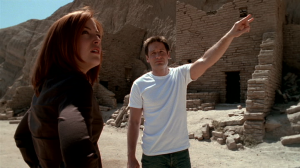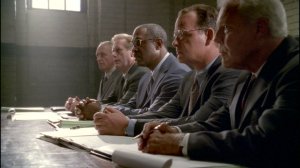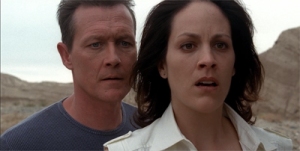Andrew Blaker goes in depth on the original series finale, now Season 9 finale 'The Truth'...

'The Truth' brought to an end a landmark sci-fi TV series but was tasked with the impossible task of satisfactorily concluding nine years of uber-convoluted mythology, as well as propelling Mulder and Scully into the future, when the question of whether we’d ever again see them was very much unknown. It would, in fact, be six years before I Want to Believe hit theaters, and the series finale could very well have been the end for the beloved franchise.
Focusing on the final minutes of the episode, Mulder and Scully are last seen in a motel room in Roswell, New Mexico, echoing an intimate conversation the duo held in the pilot episode. Their fates are unknown: Mulder, and maybe Scully, are wanted by the FBI, and the toll their quest for the ever-elusive “truth” has taken on the duo—professionally and personally, including the “loss” of their son, William—is apparent. Their fates are left unresolved, but the viewer is nonetheless satisfied knowing they are reunited and protective of one another. Mulder’s final words, “maybe there’s hope,” have never sounded so wistful and promising.
But there are nearly 90 minutes before we get to that final scene. The series finale is not a perfect episode, but in this writer’s opinion does a solid job of summarizing the nine years of convoluted and at times oblique mythology that has consumed (and threatened) Mulder and Scully’s lives. For a significant chunk of the episode, it plays like a clip show, or “greatest hits” montage.

There are some solid moments throughout. Skinner finally gets a meaty role, cast as Mulder’s impromptu defense attorney. A.D. Kersh is thoroughly despicable for most of the episode, but proved himself a semi-decent guy by aiding in Mulder’s escape. And bringing many of the key players into the series finale to testify on Mulder’s behalf—Marita Covarrubias, Jeffrey Spender, Gibson Praise, and even Doggett and Reyes—while certainly adding credo to the “greatest hits” vibe, does hit on key aspect of the show’s history.
There are, however, plenty of disappointing moments throughout. First off, you can tell Chris Carter wrote it. The episode is chockful of the vague, pseudo-spiritual dialogue that weighed down the Chris Carter-penned episodes of Season 10 ('Babylon' anyone?) that really doesn’t reveal anything new in 'The Truth'. Every one of Mulder’s witnesses are “discredited” with a simple question, and this is just sloppy, lazy writing on Chris Carter’s part. Yes, the FBI lies to protect itself. Nothing earth-shattering here. Mulder’s trial very much feels contrived and awfully desperate (which it was), but the way this plays in the series is a bit anticlimactic. Was anyone surprised Mulder was found guilty, and sentenced to death? Did we expect anything different? And what happened to Skinner and Kersh? Skinner’s called into a meeting between Kersh and Toothpick Man just after Mulder’s escape, but we don’t learn what was discussed. This is a pretty jarring thread to leave hanging.

Doggett and Reyes are not given any real closure, despite helping Mulder and Scully escape the abuelos. And the confrontation with CSM is a nice touch, and there really is no other way the series villain should have gone out. Did anyone really believe a tumble down the stairs would finish him?
Ultimately, the series finale is anti-climactic but faithful to the mytharc. Hardly the worst episode of the series, and certainly not among its greatest episodes.
One small mercy here: a final scene filmed between Toothpick Man (Alan Dale), who was poised to become the new CSM, and a George W. Bush look-a-like, was cut and relegated to the DVD bonus features. Best decision Chris Carter made for the episode: it’s a cringe-worthy and completely pointless scene, trapping the finale in the geopolitical issues of the day, and would have completely usurped the great ending scene between Mulder and Scully.
You can follow Andrew on Twitter @andrewblaker620.

No comments:
Post a Comment